HUCL1101 - Healthcare Role Concept: Cultural Beliefs of Hispanics
VerifiedAdded on 2022/11/18
|6
|1332
|319
Essay
AI Summary
This essay examines the role concept in healthcare within the Hispanic community, highlighting the influence of cultural beliefs and practices on health outcomes. It discusses fatalistic viewpoints, the central role of churches, and traditional healing practices within the Hispanic community. The essay also explores family dynamics, emphasizing the male's role in decision-making and the concept of Machismo and Marianismo. Communication styles, death and dying practices, and the importance of family support are also analyzed. Ultimately, the essay concludes that understanding these cultural factors is crucial for addressing health disparities and improving healthcare delivery to Hispanic communities, advocating for culturally sensitive education and healthcare practices to reduce mortality and morbidity rates. Desklib offers a wide range of resources, including past papers and solved assignments, to assist students in their studies.
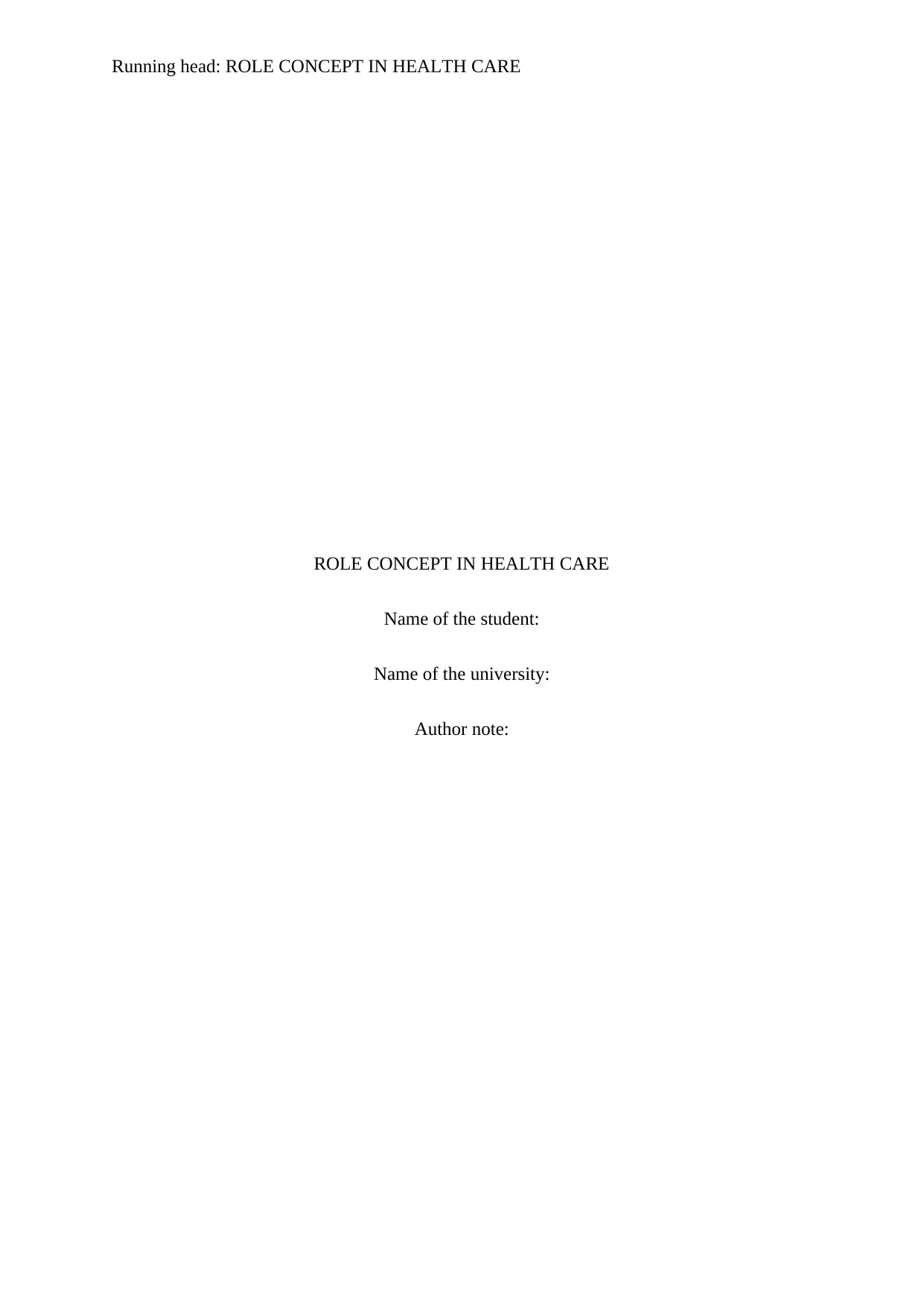
Running head: ROLE CONCEPT IN HEALTH CARE
ROLE CONCEPT IN HEALTH CARE
Name of the student:
Name of the university:
Author note:
ROLE CONCEPT IN HEALTH CARE
Name of the student:
Name of the university:
Author note:
Paraphrase This Document
Need a fresh take? Get an instant paraphrase of this document with our AI Paraphraser
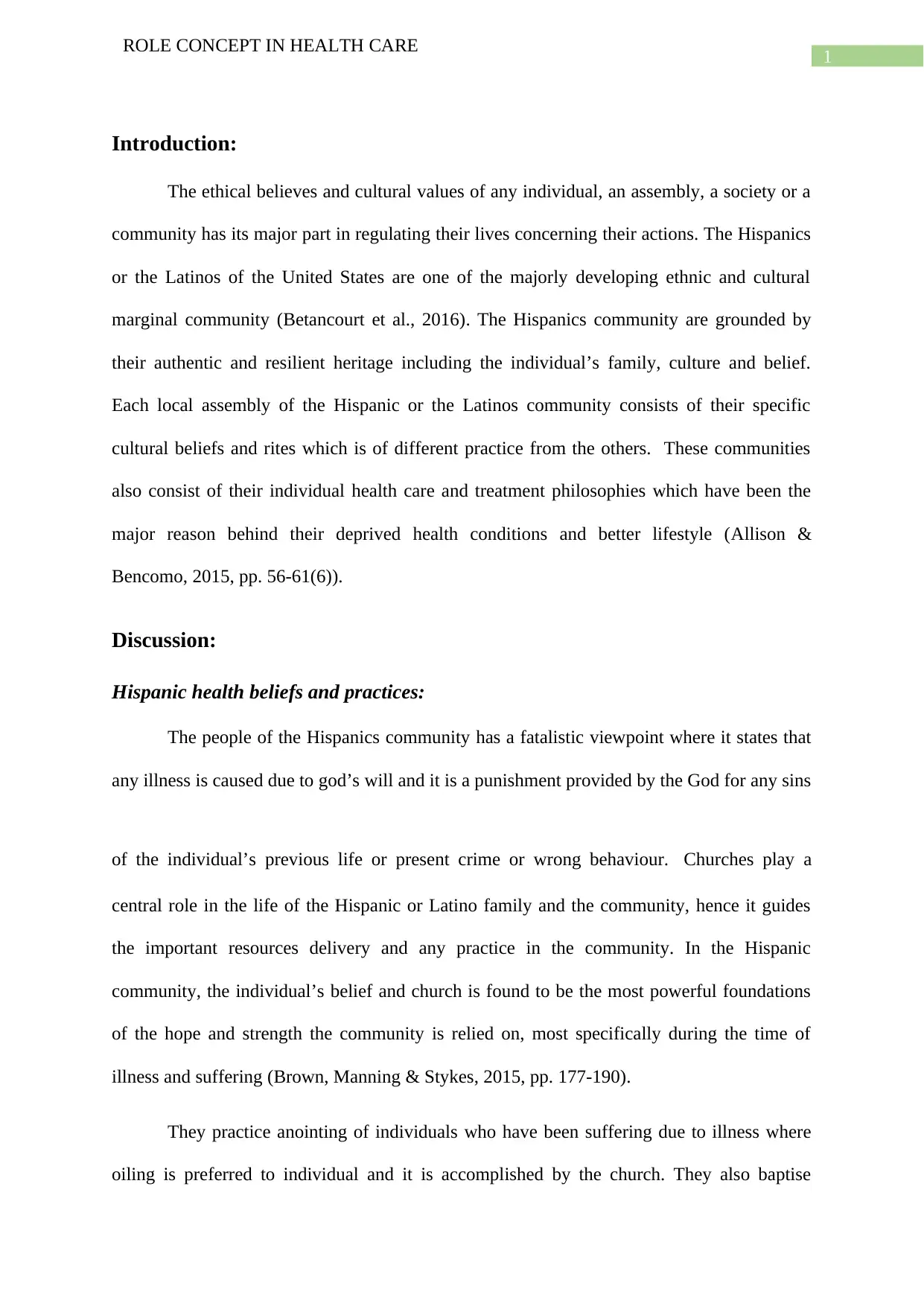
1
ROLE CONCEPT IN HEALTH CARE
Introduction:
The ethical believes and cultural values of any individual, an assembly, a society or a
community has its major part in regulating their lives concerning their actions. The Hispanics
or the Latinos of the United States are one of the majorly developing ethnic and cultural
marginal community (Betancourt et al., 2016). The Hispanics community are grounded by
their authentic and resilient heritage including the individual’s family, culture and belief.
Each local assembly of the Hispanic or the Latinos community consists of their specific
cultural beliefs and rites which is of different practice from the others. These communities
also consist of their individual health care and treatment philosophies which have been the
major reason behind their deprived health conditions and better lifestyle (Allison &
Bencomo, 2015, pp. 56-61(6)).
Discussion:
Hispanic health beliefs and practices:
The people of the Hispanics community has a fatalistic viewpoint where it states that
any illness is caused due to god’s will and it is a punishment provided by the God for any sins
of the individual’s previous life or present crime or wrong behaviour. Churches play a
central role in the life of the Hispanic or Latino family and the community, hence it guides
the important resources delivery and any practice in the community. In the Hispanic
community, the individual’s belief and church is found to be the most powerful foundations
of the hope and strength the community is relied on, most specifically during the time of
illness and suffering (Brown, Manning & Stykes, 2015, pp. 177-190).
They practice anointing of individuals who have been suffering due to illness where
oiling is preferred to individual and it is accomplished by the church. They also baptise
ROLE CONCEPT IN HEALTH CARE
Introduction:
The ethical believes and cultural values of any individual, an assembly, a society or a
community has its major part in regulating their lives concerning their actions. The Hispanics
or the Latinos of the United States are one of the majorly developing ethnic and cultural
marginal community (Betancourt et al., 2016). The Hispanics community are grounded by
their authentic and resilient heritage including the individual’s family, culture and belief.
Each local assembly of the Hispanic or the Latinos community consists of their specific
cultural beliefs and rites which is of different practice from the others. These communities
also consist of their individual health care and treatment philosophies which have been the
major reason behind their deprived health conditions and better lifestyle (Allison &
Bencomo, 2015, pp. 56-61(6)).
Discussion:
Hispanic health beliefs and practices:
The people of the Hispanics community has a fatalistic viewpoint where it states that
any illness is caused due to god’s will and it is a punishment provided by the God for any sins
of the individual’s previous life or present crime or wrong behaviour. Churches play a
central role in the life of the Hispanic or Latino family and the community, hence it guides
the important resources delivery and any practice in the community. In the Hispanic
community, the individual’s belief and church is found to be the most powerful foundations
of the hope and strength the community is relied on, most specifically during the time of
illness and suffering (Brown, Manning & Stykes, 2015, pp. 177-190).
They practice anointing of individuals who have been suffering due to illness where
oiling is preferred to individual and it is accomplished by the church. They also baptise
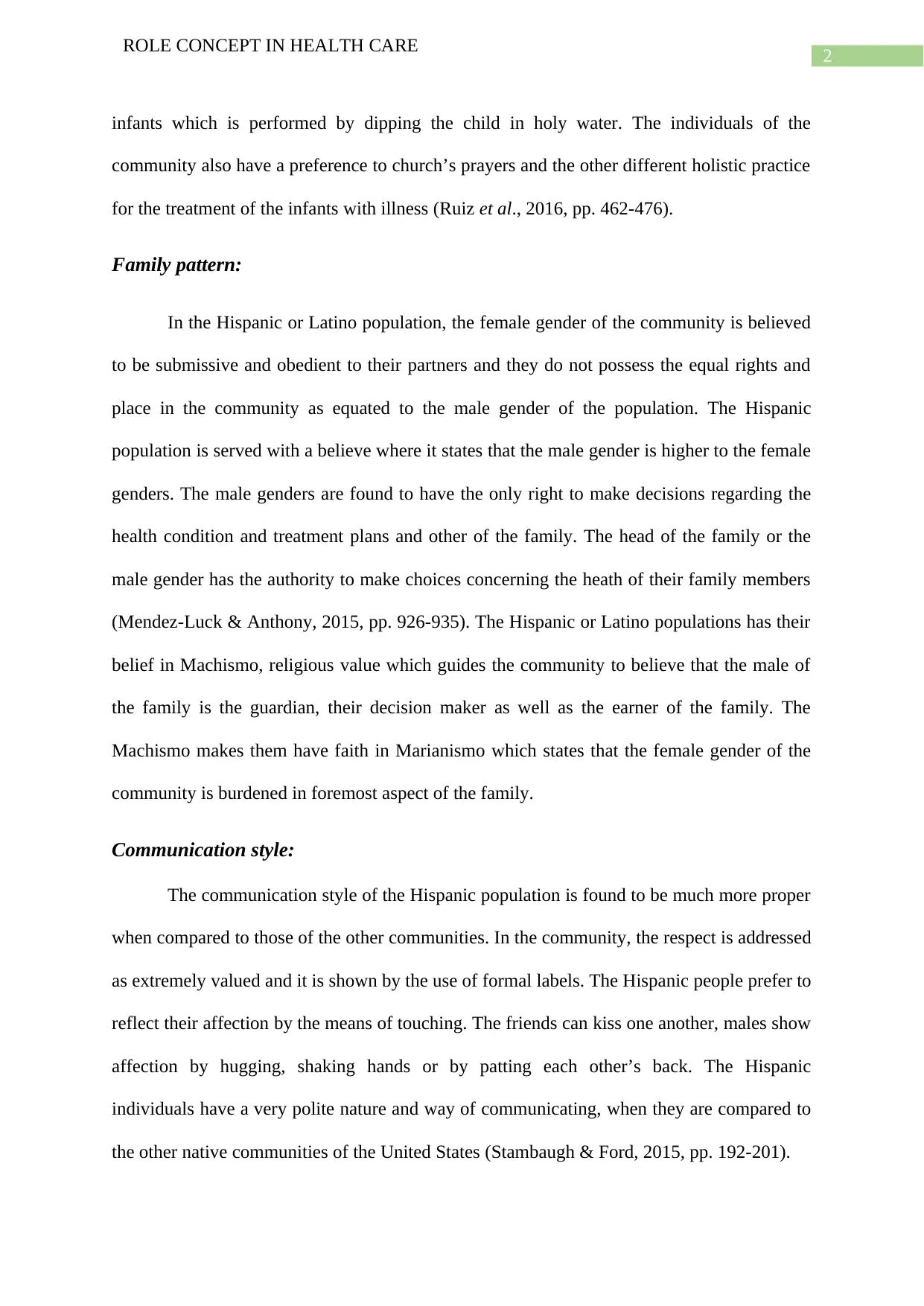
2
ROLE CONCEPT IN HEALTH CARE
infants which is performed by dipping the child in holy water. The individuals of the
community also have a preference to church’s prayers and the other different holistic practice
for the treatment of the infants with illness (Ruiz et al., 2016, pp. 462-476).
Family pattern:
In the Hispanic or Latino population, the female gender of the community is believed
to be submissive and obedient to their partners and they do not possess the equal rights and
place in the community as equated to the male gender of the population. The Hispanic
population is served with a believe where it states that the male gender is higher to the female
genders. The male genders are found to have the only right to make decisions regarding the
health condition and treatment plans and other of the family. The head of the family or the
male gender has the authority to make choices concerning the heath of their family members
(Mendez-Luck & Anthony, 2015, pp. 926-935). The Hispanic or Latino populations has their
belief in Machismo, religious value which guides the community to believe that the male of
the family is the guardian, their decision maker as well as the earner of the family. The
Machismo makes them have faith in Marianismo which states that the female gender of the
community is burdened in foremost aspect of the family.
Communication style:
The communication style of the Hispanic population is found to be much more proper
when compared to those of the other communities. In the community, the respect is addressed
as extremely valued and it is shown by the use of formal labels. The Hispanic people prefer to
reflect their affection by the means of touching. The friends can kiss one another, males show
affection by hugging, shaking hands or by patting each other’s back. The Hispanic
individuals have a very polite nature and way of communicating, when they are compared to
the other native communities of the United States (Stambaugh & Ford, 2015, pp. 192-201).
ROLE CONCEPT IN HEALTH CARE
infants which is performed by dipping the child in holy water. The individuals of the
community also have a preference to church’s prayers and the other different holistic practice
for the treatment of the infants with illness (Ruiz et al., 2016, pp. 462-476).
Family pattern:
In the Hispanic or Latino population, the female gender of the community is believed
to be submissive and obedient to their partners and they do not possess the equal rights and
place in the community as equated to the male gender of the population. The Hispanic
population is served with a believe where it states that the male gender is higher to the female
genders. The male genders are found to have the only right to make decisions regarding the
health condition and treatment plans and other of the family. The head of the family or the
male gender has the authority to make choices concerning the heath of their family members
(Mendez-Luck & Anthony, 2015, pp. 926-935). The Hispanic or Latino populations has their
belief in Machismo, religious value which guides the community to believe that the male of
the family is the guardian, their decision maker as well as the earner of the family. The
Machismo makes them have faith in Marianismo which states that the female gender of the
community is burdened in foremost aspect of the family.
Communication style:
The communication style of the Hispanic population is found to be much more proper
when compared to those of the other communities. In the community, the respect is addressed
as extremely valued and it is shown by the use of formal labels. The Hispanic people prefer to
reflect their affection by the means of touching. The friends can kiss one another, males show
affection by hugging, shaking hands or by patting each other’s back. The Hispanic
individuals have a very polite nature and way of communicating, when they are compared to
the other native communities of the United States (Stambaugh & Ford, 2015, pp. 192-201).
⊘ This is a preview!⊘
Do you want full access?
Subscribe today to unlock all pages.

Trusted by 1+ million students worldwide
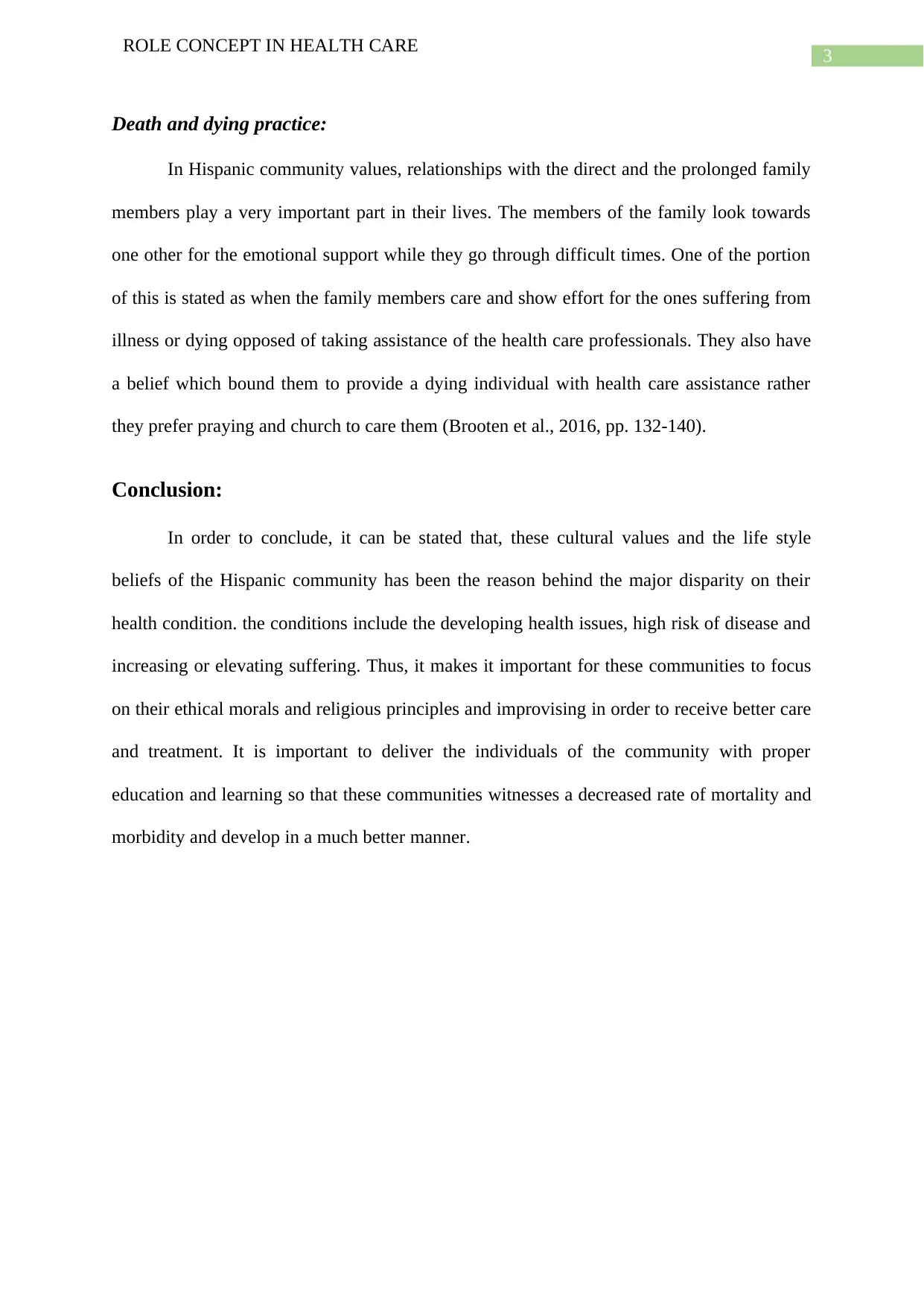
3
ROLE CONCEPT IN HEALTH CARE
Death and dying practice:
In Hispanic community values, relationships with the direct and the prolonged family
members play a very important part in their lives. The members of the family look towards
one other for the emotional support while they go through difficult times. One of the portion
of this is stated as when the family members care and show effort for the ones suffering from
illness or dying opposed of taking assistance of the health care professionals. They also have
a belief which bound them to provide a dying individual with health care assistance rather
they prefer praying and church to care them (Brooten et al., 2016, pp. 132-140).
Conclusion:
In order to conclude, it can be stated that, these cultural values and the life style
beliefs of the Hispanic community has been the reason behind the major disparity on their
health condition. the conditions include the developing health issues, high risk of disease and
increasing or elevating suffering. Thus, it makes it important for these communities to focus
on their ethical morals and religious principles and improvising in order to receive better care
and treatment. It is important to deliver the individuals of the community with proper
education and learning so that these communities witnesses a decreased rate of mortality and
morbidity and develop in a much better manner.
ROLE CONCEPT IN HEALTH CARE
Death and dying practice:
In Hispanic community values, relationships with the direct and the prolonged family
members play a very important part in their lives. The members of the family look towards
one other for the emotional support while they go through difficult times. One of the portion
of this is stated as when the family members care and show effort for the ones suffering from
illness or dying opposed of taking assistance of the health care professionals. They also have
a belief which bound them to provide a dying individual with health care assistance rather
they prefer praying and church to care them (Brooten et al., 2016, pp. 132-140).
Conclusion:
In order to conclude, it can be stated that, these cultural values and the life style
beliefs of the Hispanic community has been the reason behind the major disparity on their
health condition. the conditions include the developing health issues, high risk of disease and
increasing or elevating suffering. Thus, it makes it important for these communities to focus
on their ethical morals and religious principles and improvising in order to receive better care
and treatment. It is important to deliver the individuals of the community with proper
education and learning so that these communities witnesses a decreased rate of mortality and
morbidity and develop in a much better manner.
Paraphrase This Document
Need a fresh take? Get an instant paraphrase of this document with our AI Paraphraser
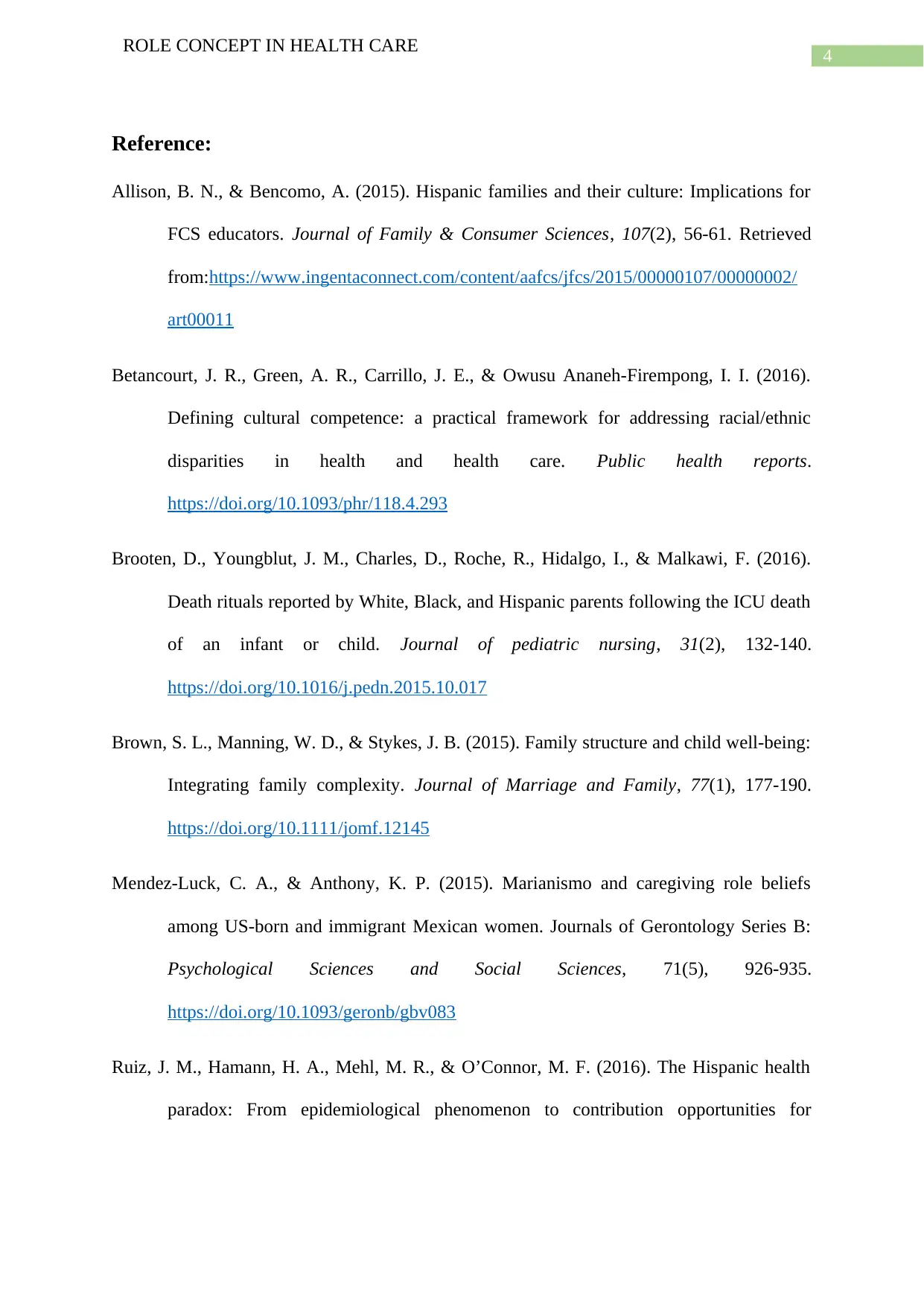
4
ROLE CONCEPT IN HEALTH CARE
Reference:
Allison, B. N., & Bencomo, A. (2015). Hispanic families and their culture: Implications for
FCS educators. Journal of Family & Consumer Sciences, 107(2), 56-61. Retrieved
from:https://www.ingentaconnect.com/content/aafcs/jfcs/2015/00000107/00000002/
art00011
Betancourt, J. R., Green, A. R., Carrillo, J. E., & Owusu Ananeh-Firempong, I. I. (2016).
Defining cultural competence: a practical framework for addressing racial/ethnic
disparities in health and health care. Public health reports.
https://doi.org/10.1093/phr/118.4.293
Brooten, D., Youngblut, J. M., Charles, D., Roche, R., Hidalgo, I., & Malkawi, F. (2016).
Death rituals reported by White, Black, and Hispanic parents following the ICU death
of an infant or child. Journal of pediatric nursing, 31(2), 132-140.
https://doi.org/10.1016/j.pedn.2015.10.017
Brown, S. L., Manning, W. D., & Stykes, J. B. (2015). Family structure and child well‐being:
Integrating family complexity. Journal of Marriage and Family, 77(1), 177-190.
https://doi.org/10.1111/jomf.12145
Mendez-Luck, C. A., & Anthony, K. P. (2015). Marianismo and caregiving role beliefs
among US-born and immigrant Mexican women. Journals of Gerontology Series B:
Psychological Sciences and Social Sciences, 71(5), 926-935.
https://doi.org/10.1093/geronb/gbv083
Ruiz, J. M., Hamann, H. A., Mehl, M. R., & O’Connor, M. F. (2016). The Hispanic health
paradox: From epidemiological phenomenon to contribution opportunities for
ROLE CONCEPT IN HEALTH CARE
Reference:
Allison, B. N., & Bencomo, A. (2015). Hispanic families and their culture: Implications for
FCS educators. Journal of Family & Consumer Sciences, 107(2), 56-61. Retrieved
from:https://www.ingentaconnect.com/content/aafcs/jfcs/2015/00000107/00000002/
art00011
Betancourt, J. R., Green, A. R., Carrillo, J. E., & Owusu Ananeh-Firempong, I. I. (2016).
Defining cultural competence: a practical framework for addressing racial/ethnic
disparities in health and health care. Public health reports.
https://doi.org/10.1093/phr/118.4.293
Brooten, D., Youngblut, J. M., Charles, D., Roche, R., Hidalgo, I., & Malkawi, F. (2016).
Death rituals reported by White, Black, and Hispanic parents following the ICU death
of an infant or child. Journal of pediatric nursing, 31(2), 132-140.
https://doi.org/10.1016/j.pedn.2015.10.017
Brown, S. L., Manning, W. D., & Stykes, J. B. (2015). Family structure and child well‐being:
Integrating family complexity. Journal of Marriage and Family, 77(1), 177-190.
https://doi.org/10.1111/jomf.12145
Mendez-Luck, C. A., & Anthony, K. P. (2015). Marianismo and caregiving role beliefs
among US-born and immigrant Mexican women. Journals of Gerontology Series B:
Psychological Sciences and Social Sciences, 71(5), 926-935.
https://doi.org/10.1093/geronb/gbv083
Ruiz, J. M., Hamann, H. A., Mehl, M. R., & O’Connor, M. F. (2016). The Hispanic health
paradox: From epidemiological phenomenon to contribution opportunities for
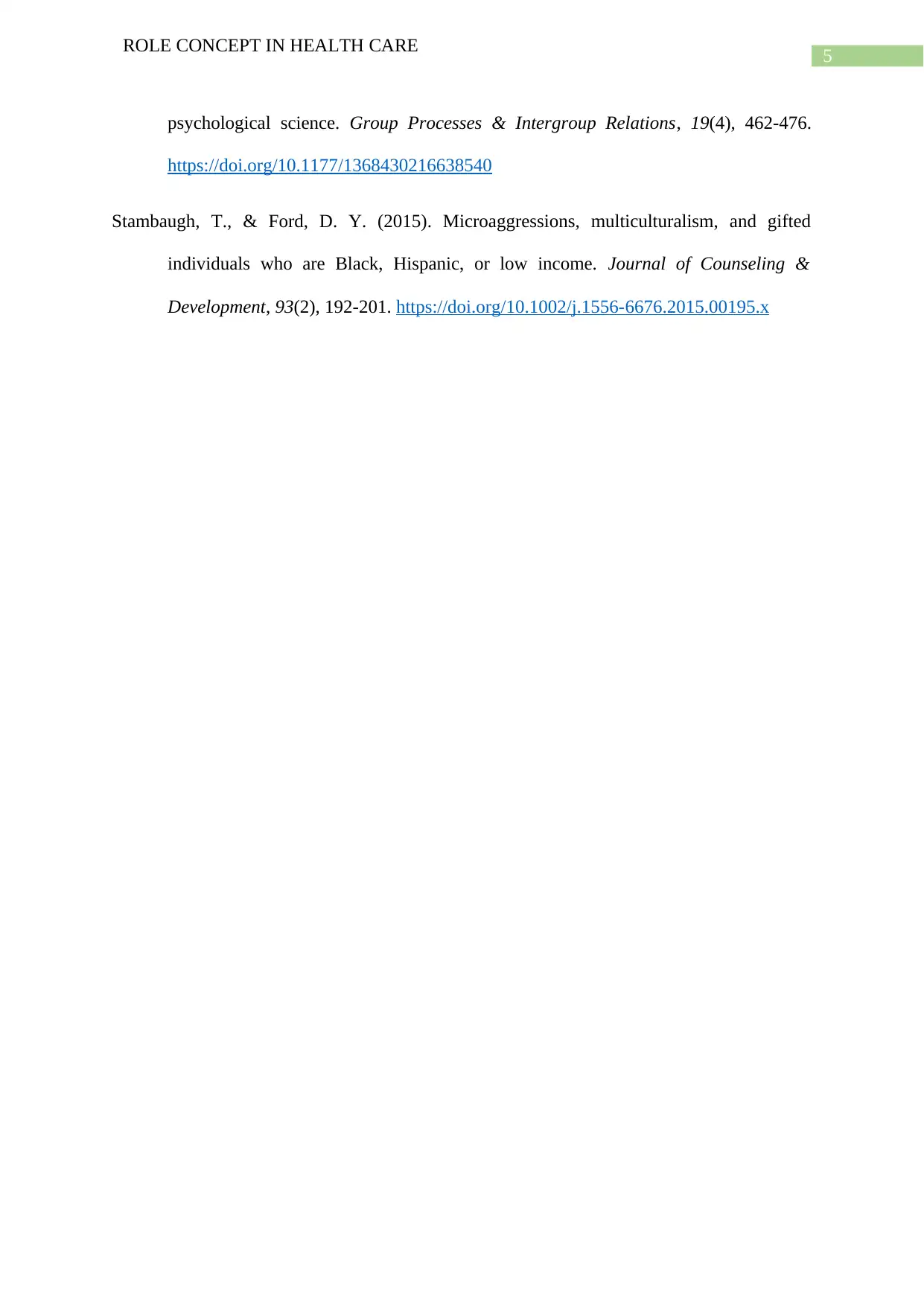
5
ROLE CONCEPT IN HEALTH CARE
psychological science. Group Processes & Intergroup Relations, 19(4), 462-476.
https://doi.org/10.1177/1368430216638540
Stambaugh, T., & Ford, D. Y. (2015). Microaggressions, multiculturalism, and gifted
individuals who are Black, Hispanic, or low income. Journal of Counseling &
Development, 93(2), 192-201. https://doi.org/10.1002/j.1556-6676.2015.00195.x
ROLE CONCEPT IN HEALTH CARE
psychological science. Group Processes & Intergroup Relations, 19(4), 462-476.
https://doi.org/10.1177/1368430216638540
Stambaugh, T., & Ford, D. Y. (2015). Microaggressions, multiculturalism, and gifted
individuals who are Black, Hispanic, or low income. Journal of Counseling &
Development, 93(2), 192-201. https://doi.org/10.1002/j.1556-6676.2015.00195.x
⊘ This is a preview!⊘
Do you want full access?
Subscribe today to unlock all pages.

Trusted by 1+ million students worldwide
1 out of 6
Related Documents
Your All-in-One AI-Powered Toolkit for Academic Success.
+13062052269
info@desklib.com
Available 24*7 on WhatsApp / Email
![[object Object]](/_next/static/media/star-bottom.7253800d.svg)
Unlock your academic potential
Copyright © 2020–2026 A2Z Services. All Rights Reserved. Developed and managed by ZUCOL.





